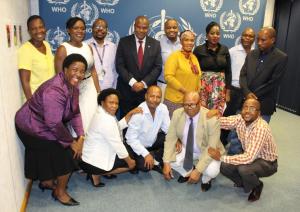Botswana Concluded Training Using The Theory Of Change Planning Methodology To Achieve Programme Results
Gaborone, Botswana – 20 April 2018: The WCO Botswana team has today completed a 5-days long intense training exercise using “Theory of Change (ToC)” planning methodology of reflection to explore opportunities for achievement of programme priorities. The exercise involved reflective exploration of causal issues driving identified health challenges including why change is needed and how it happens. The TOC is a robust and simple to apply planning tool that enables definition of broad vision results, including how intended results can be achieved.
ToC aligns well with the on-going organizational transformation in WHO, and is a useful addition that compliments existing tools as it drives focus on achievement of results with clearer attributable links to defined health outcomes. Given its strength in eliciting granular issues of relevance to people and communities, it is considered a good utility to complement on-going WHO Transformation effort which aims to change the way our approach to better serve communities considering expectations in the SDG era.
The Country Office, with support from the Regional Office, undertook orientation on application of the Theory of Change methodology to facilitate results based management (RBM) objectives with focus on achievement of country priorities aligned with the GPW 13 framework to enable WHO’s contribution to a healthier world.
The objective of the training was to equip technical staff with requisite knowledge to effectively:
1. Apply RBM/ToC principles to the design, implementation, monitoring and evaluation of programmes, and in reporting on results.
2. Use available tools and approaches to strengthen results-oriented health programmes.
3. Apply Elaborate Strategic Result Notes
At the end of the training, staff members reflected on this training experience and shared their views. Some of the comments were:
1. “I like the way the TOC analysis are done because you don’t analyze superficially but go deeper until you get to the root causes which helps solves the root problems.” - Mrs Bakanuki F Nfila
2. “Big improvement in the planning process; I think this gives you the whole process of planning right up to your results and can assist us better monitor our results.” - Mr Moagi Gaborone
3. “I think for WHO, it is a different way of planning, I am excited.” - Dr Tebogo Madidimalo
4. “Very good learning curve, I came into WHO during the period of transformation agenda and this has come to facilitate quicker learning of where WHO is going to.” - Mr Godira Segoea
5. “The exercise enhances objectivity and focus on how WHO avails services to the community & we can speak one language because we now have a broader picture of what and how provide support to communities.” - Mr Nhamo Mapuranga
6. “The ToC has afforded us a resource mobilization tool in one stop short, showing the challenges, the target interventions hence where to better target are resource mobilization activities for the country.” - Dr Martins Ovberedjo
As part of the next steps as a follow-up to the training outcomes, the Country Office will develop its Strategic Result Notes in line with the 13th Global Programme of Work (GPW13) using materials produced during the training. The training was concluded on the need for focus on national health priorities, which are aligned to regional and global priorities including alignment with UHC aspirations and achievement of the health targets of the Sustainable Development Goals (SDGs).



